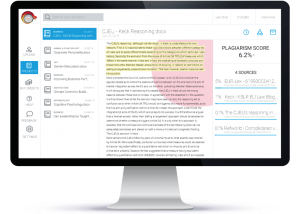

In fact, the only time it’s mentioned at all is when you agree to the terms of service, but even then, it isn’t mentioned explicitly.Įven then, you have to be sure to click through to the TOS and read it.
VIPER PLAGIARISM CHECKER SOFTWARE
There’s no mention of this policy on the front page of their site and, as I tested earlier, it’s possible to go through the entire process of setting up an account, downloading and installing the Viper software without being clear. While Viper claims that it is being transparent about the use of your content, to me, that is debatable. In short, 9 months after using Viper in a bid to prevent plagiarism, the essay will appear on a website where students will likely be looking for content to plagiarize themselves. These sites, often called essay mills, claim to be study aid tools but are widely used by students seeking to find essays to plagiarize in their own coursework.

However, after 9 months, the essay is then posted on a public website for students to use.

This part is fairly mundane and is done by other plagiarism detection services. What this means is that, once you submit an essay to Viper, first it is immediately stored in its database for later comparisons. It then also provides a link to the page above, further explaining its policies. You may not use the Viper Software to scan documents for which you do not hold sufficient intellectual property to be able to authorise us to use the documents in accordance with the terms of this licence. You agree that any right you may have to remuneration for such use of documents is waived. When you scan a document, you agree that 9 months after completion of your scan, we will automatically upload your essay to our student essays database which will appear on one of our network of websites so that other students may use it to help them write their own essays. That section, in turn, mentions the following:
VIPER PLAGIARISM CHECKER LICENSE
While most of the TOS is dedicated to your license to use Viper and its software, a section entitled “Store and Use of Your Documents” deals with the license you grant Viper in the work you submit. Viper, like most plagiarism detection services, has a terms of service. Unfortunately, this is just another cautionary tale about working with questionable plagiarism detection services and the dangers that they can pose. In short, the terms of service of Viper make it so that every single essay checked through it is, eventually, posted on one of a network of essay mill sites and there is nothing that the rightsholder and creator can do about it.īut while Viper does openly admit to doing this, their claims of being “transparent” ring hollow as the information is well-hidden on their site and it’s possible, if not likely, most people using the service are unaware that Viper is feeding their essays to various sites with the intent of making the available for others to use. They provided a link that indicated how that happened. When the paper eventually came down, the site involved explained that all of the content on its site was sourced from the Viper Anti-Plagiarism Scanner. Last week, Zulfiqar Ali Khan, a researcher at the Syed University of Engineer, wrote me seeking help getting a paper of his removed from an essay mill website (a website dedicated to posting copies of essays for students to use and often plagiarize from). However, it appears that it may have been a mistake. Like most ineffective plagiarism detection services, I quickly forgot about it and moved on. I found the service, which can be found at, to be slow, poor at detecting matches and generally far less useful than similar services. Back in 2010, I wrote a review of the Viper Anti-Plagiarism Scanner and, to put it modestly, I was not impressed.


 0 kommentar(er)
0 kommentar(er)
